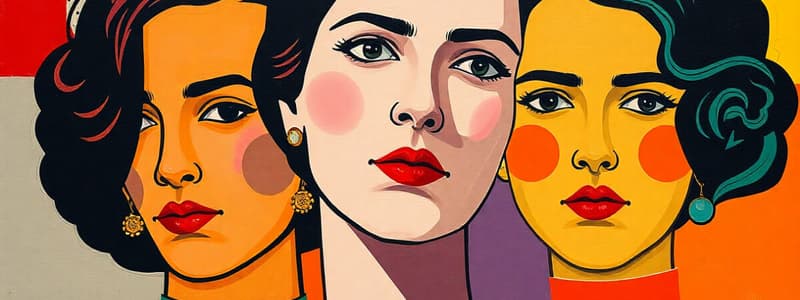Podcast
Questions and Answers
What motivated Lucy Stone to stop sewing clothes for college boys?
What motivated Lucy Stone to stop sewing clothes for college boys?
- She wanted to participate in women’s rights activism.
- She wanted to create a sewing business.
- She wanted to focus on her studies.
- She disagreed with the idea of sending only boys to college. (correct)
What were Lucy Stone's means of supporting her education while at Oberlin College?
What were Lucy Stone's means of supporting her education while at Oberlin College?
- She borrowed money from friends.
- She worked as a waitress at a local diner.
- She sold berries and taught. (correct)
- She received scholarships.
How did Lucy Stone's pay compared to male students while she was at Oberlin?
How did Lucy Stone's pay compared to male students while she was at Oberlin?
- She earned less than male students. (correct)
- She volunteered without pay.
- She earned more than male students.
- She earned the same as male students.
What was Lucy's response when asked if hostility would end her speaking career?
What was Lucy's response when asked if hostility would end her speaking career?
What did Lucy Stone do in protest of unequal pay at Oberlin College?
What did Lucy Stone do in protest of unequal pay at Oberlin College?
What significant action did Lucy take regarding her family name after her marriage?
What significant action did Lucy take regarding her family name after her marriage?
What significant action did Lucy refuse to take at her graduation ceremony?
What significant action did Lucy refuse to take at her graduation ceremony?
In what year did Lucy help organize the first national women's rights convention?
In what year did Lucy help organize the first national women's rights convention?
What accomplishment did Lucy achieve after three months of striking?
What accomplishment did Lucy achieve after three months of striking?
What was Lucy's view on marriage during her advocacy?
What was Lucy's view on marriage during her advocacy?
Which characteristic of Lucy Stone helped her in her career as a speaker?
Which characteristic of Lucy Stone helped her in her career as a speaker?
What did Lucy and her husband do when they received their first tax bill?
What did Lucy and her husband do when they received their first tax bill?
What was the nature of Lucy's relationship with her parents regarding her educational pursuits?
What was the nature of Lucy's relationship with her parents regarding her educational pursuits?
Which organization did Lucy cofound in 1869?
Which organization did Lucy cofound in 1869?
What was the primary focus of The Woman's Journal, which Lucy began publishing?
What was the primary focus of The Woman's Journal, which Lucy began publishing?
How did Lucy perceive the role of women in society?
How did Lucy perceive the role of women in society?
Flashcards
Why did Lucy Stone stop sewing shirts for college boys?
Why did Lucy Stone stop sewing shirts for college boys?
Lucy Stone refused to sew anymore shirts for college boys because she felt it was unfair that girls were denied the opportunity to attend college.
How did Lucy's father react to her decision to go to college?
How did Lucy's father react to her decision to go to college?
Lucy's father was initially skeptical about her decision to go to college, questioning her sanity.
Which college did Lucy Stone attend and why was it significant?
Which college did Lucy Stone attend and why was it significant?
Oberlin College, a mixed-gender institution, was Lucy Stone's chosen destination for higher education, making her one of the pioneers of women's education.
What inequality did Lucy Stone face at Oberlin College?
What inequality did Lucy Stone face at Oberlin College?
Signup and view all the flashcards
How did Lucy challenge the tradition of women not speaking in front of male students?
How did Lucy challenge the tradition of women not speaking in front of male students?
Signup and view all the flashcards
Why did Lucy Stone refuse to have a man read her graduation speech?
Why did Lucy Stone refuse to have a man read her graduation speech?
Signup and view all the flashcards
Why did Lucy Stone resign from her teaching position at Oberlin?
Why did Lucy Stone resign from her teaching position at Oberlin?
Signup and view all the flashcards
What was misleading about Lucy Stone's appearance and demeanor?
What was misleading about Lucy Stone's appearance and demeanor?
Signup and view all the flashcards
Who was Lucy Stone?
Who was Lucy Stone?
Signup and view all the flashcards
What was Lucy Stone known for advocating for?
What was Lucy Stone known for advocating for?
Signup and view all the flashcards
What were Lucy Stone's views on women's roles in society?
What were Lucy Stone's views on women's roles in society?
Signup and view all the flashcards
What were Lucy Stone's views on marriage?
What were Lucy Stone's views on marriage?
Signup and view all the flashcards
What was Lucy Stone's stand on women's financial autonomy?
What was Lucy Stone's stand on women's financial autonomy?
Signup and view all the flashcards
What were Lucy Stone's contributions to the women's rights movement?
What were Lucy Stone's contributions to the women's rights movement?
Signup and view all the flashcards
How did Lucy Stone contribute to the women's rights movement through writing?
How did Lucy Stone contribute to the women's rights movement through writing?
Signup and view all the flashcards
What is Lucy Stone's legacy?
What is Lucy Stone's legacy?
Signup and view all the flashcards
Study Notes
Lucy Stone: A Pioneer for Women's Rights
- Lucy Stone (1818-1893) was a prominent American women's rights advocate and abolitionist.
- As a teenager, she participated in a sewing circle, and witnessed firsthand the limited opportunities for women, which sparked her advocacy.
- At Oberlin College, she experienced the unequal treatment of women, which motivated her to work for improved conditions.
- She refused to pay tuition at Oberlin College, ultimately working with male students to achieve equal pay, demonstrating her tenacity and activism.
- Despite opposition, Lucy stood firm in her beliefs, advocating tirelessly for women's rights.
- She was a skilled orator and was able to convince people.
- Lucy's early work focused on education and career opportunities for women.
- She actively campaigned against gender inequality in various aspects of life, including education, employment, and political participation.
- Her focus extended to advocating for women's right to vote.
- Lucy Stone organized and participated in numerous women's rights conventions, significantly shaping the movement.
- She refused to conform to patriarchal norms, which negatively impacted societal perceptions of women.
- She refused to compromise her values and relentlessly pursued equality and justice.
- She worked alongside other influential figures and activists, including Lucretia Mott and Abby Kelley Foster.
Early Life and Education
- Lucy Stone was part of a sewing circle creating clothes for local boys attending college.
- She was inspired to challenge the limited opportunities available for women.
- Experienced discrimination at Oberlin College, leading to her refusal to conform and advocacy for equal pay and rights for women.
Advocating for Women's Rights
- Lucy Stone challenged traditional societal norms and expectations of women's roles.
- She actively campaigned for women's equal rights and education.
- Lucy Stone, along with other women, cofounded the American Woman Suffrage Association (1869).
- She published The Woman's Journal, a weekly newspaper.
- She travelled around the country giving speeches, advocating for women's rights.
Challenges and Opposition
- Lucy faced opposition and prejudice from various groups, even fellow women, in her advocacy efforts.
- Women faced ridicule and hostility while presenting, both through heckling and physical attacks.
- Her refusal to conform to social standards often led to criticism and social ostracism.
Studying That Suits You
Use AI to generate personalized quizzes and flashcards to suit your learning preferences.




